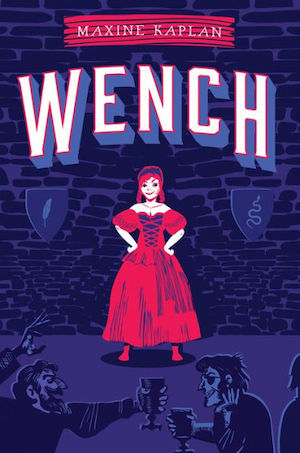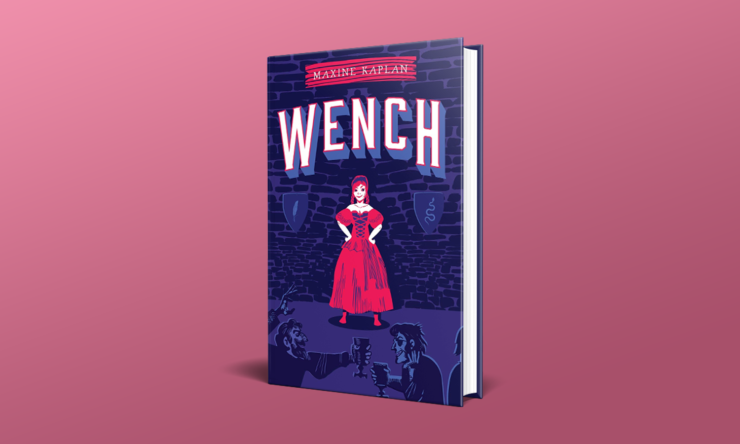Let there be many more books about tavern wenches. Barkeeps, cobblers, tailors, fletchers, the blacksmith who’s just really tired of how the soldiers treat her finest work—I’d like books about all of them, please. Every character trope in the fantasy toolbox can be a person who deserves to have their story told.
In her second YA novel, Wench, Maxine Kaplan plucks a longtime tavern girl from behind the bar and shoves her headlong into a tumultuous adventure. Seventeen(ish)-year-old Tanya is deeply attached to her identity as the person who keeps things running. Orphaned at a young age, she was taken in by the owner of the Smiling Snake, who’s getting on in years. Tanya always expected he would leave the tavern to her.
Maybe he just forgot to do the paperwork.
Within the first ten pages, Tanya loses the inn, which is requisitioned by a commander in the Queen’s corps. But she’s nothing if not determined, and insists that Commander Rees take her along to the capital so that she might petition Queen and Council to get the property back.
Naturally, things quickly begin to go wrong.
Wench isn’t really a madcap sort of book, but if I tried to sum up every shift in plot, you might think it was. Tanya joins the soldiers; the soldiers get robbed by another fierce teenage girl; there’s a leader of thieves and a semi-magical horse and a very put-out magical apprentice who isn’t as good at turning into a bird as he might like to be. There’s dubious royalty and scheming politicians and a quirky magic system and a town with a dark reputation that might be home to a demon. There are several kind and handsome young men who are a bit hard to keep straight; there are two potential love interests for our heroine (one sweet young man and one feisty young woman) and the occasional welcome reminder that Tanya has a belly and curves.
Buy the Book


Wench
Though the pacing is out of balance—the book is slow to get rolling, then gallops toward the climax—there’s a lot to like here, including Kaplan’s determination to elevate Tanya’s skillset. It isn’t necessarily the kind of thing that gets a lot of the fantasy spotlight: she’s organized and efficient, good at things like mending and cooking and seeing what each person in the bar needs at any given moment. Kaplan applies an eye for detail that insists that we reconsider what kind of skills are more valued in a fantasy world. Sure, Jana is a deft tracker and fighter and can wear the hell out of some leather pants, but she’s no help in camp—and that skill matters too. Someone has to brush every horse, brew every pot of coffee, and source every bottle of wine that crosses the page. All those epic feasts that fantasy is so fond of? They don’t cook themselves.
When Tanya gets to Bloodstone, the sulfuric city with the bad reputation, it turns out to be so much more: a place kept together by another intensely competent woman, the daunting Madame Moreagan, who sees in Tanya a kindred spirit and maybe a successor. But Tanya just wants her inn back, and has gone to great lengths on her quest to obtain it.
Wench is broken into two parts, but there are really three sections: the road trip/thief-party shenanigans on the way to the Glacier, where the Queen and Council rule; Tanya’s time at the Glacier, where she has a brief yet meaningful epiphany about class and connects with the mysterious and nameless Queen; and the closing section in Bloodstone, which is full of creepy black sludge and ominous Others. And I haven’t even gotten to the blood magic or the college of snotty magical scholars.
What sweeps Tanya away through all of these adventures is a magical quill that only she can properly use. Like the semi-magical horse, it seems to like her. After some success with the quill, Tanya decides that it works for her because she’s organized, and before long, this snowballs into an only-I-know-what’s-right attitude that ties into her need to be of use. With the quill, she can always be useful, always make things better. Until, inevitably, that proves to not be true.
The importance of being of use is at the center of a tangled, affecting thread in Wench. Tanya worries that she’s just meant to serve, since she’s most comfortable when she feels like she’s providing something to the people around her. (This girl can settle in with a den of thieves if she has something to do.) Her competence has crystallized into an almost toxic form of self-reliance. That tendency toward self-reliance is understandable—she’s been running that inn since her tweens, and seems to have had no real friends or companionship. Of course it takes her a while to understand that it’s okay to let people help, and to let people get close to her, literally and figuratively. She has to learn that she can matter to other people without being of “value” to them in a transactional sense.
I finished Wench with a lot of questions, some of which seem intentionally left unanswered. The worldbuilding details can be vague, and while there is a primary magic system, there also seem to be other forms of magic that aren’t exactly connected to the primary system. Some of these curiosities swirl around an antagonist for whom I felt no small amount of sympathy, and whose backstory seems prime for exploring. Wench’s moderately happy ending leaves a lot of (tavern) doors open—but of course, there are all those other regular folks in any given fantasy town, and they’ve got stories too.
Wench is available from Amulet Books.
Read an excerpt here.
Molly Templeton lives and writes in Oregon, and spends as much time as possible in the woods. You can also find her on Twitter.










